In this week’s review of Court Judgments, we look at the Supreme Court’s directions regarding the treatment of sex workers, time frame for considering applications for employment under compassionate grounds, fault, or shortcoming of the staff of the Subordinate Court or delay in compliance not being reasons for transferring cases, and Odisha High Court’s observation that every transgender has the right to choose a gender.
SC: Sex workers should be treated with dignity, included in decision-making, and identity should not be revealed by the media
The case Budhadev Karmaskar vs. State of West Bengal And Ors involved the brutal murder of a sex worker in 1999. The appellant was convicted of the murder by the Kolkata High Court and his appeal to the Supreme Court was dismissed more than a decade ago. However, the Supreme Court then suo motu converted the case into a PIL to address the problems faced by sex workers in the country, in the absence of legislation.
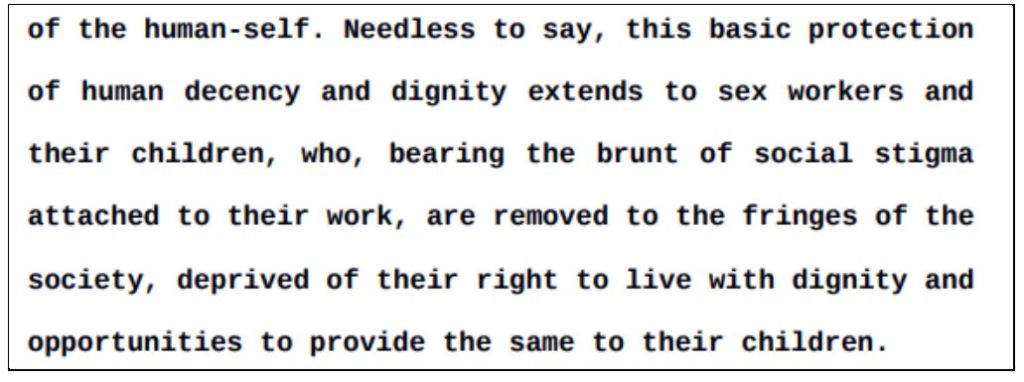
Recently, the Supreme Court Bench comprising justices L. Nageswara Rao, B.R. Gavai and A.S. Bopanna issued directions invoking special powers under Article 142 of the Constitution of India that will be valid till the time the Union Government comes up with legislation. The directions also take into consideration some recommendations made by a panel on the rights of sex workers, appointed by the Court in 2011. The directions are:
- Sex workers who are victims of sexual assault must be provided with the facilities that are available to survivors including medico-legal care.
- Police and other law enforcement agencies must be sensitized to treat sex workers with dignity, who like others, are also entitled to basic human rights. Verbal, physical, or sexual abuse should be stopped.
- The media should take utmost care not to reveal the identities of sex workers, during arrest, raid, and rescue operations, whether as victims or accused.
- Measures that sex workers resort to for their health and safety like the use of condoms, should not be construed as offences or seen as evidence of the commission of an offence.
- Workshops must be carried out for educating the sex workers about their rights, the legality of sex work, the rights, and obligations of the police, etc.
- The state governments may survey all protective homes under the Immoral Trafficking (Protection) Act to release those adult women who have been detained against their will.
However, the Union Government had accepted only some of the recommendations of the panel among the directions issued by the Court. It raised objections to the following recommendations:
- Sex workers are entitled to equal protection of the law and criminal law must be applied equally in all cases, based on ‘age’ and ‘consent’. If the sex worker is an adult and is consenting, the police must not interfere or take criminal action.
- Voluntary sex work is not illegal but running a brothel is unlawful. So, during raids, sex workers should not be arrested, penalized, harassed, or victimized.
- Both the Central and State Government must involve sex workers in all decision-making processes, including planning, designing, and implementing any policy or programme for them.
- A child of a sex worker should not be separated from the mother merely because she is in the sex trade. If a minor is found living in a brothel or with sex workers, it should not be presumed that the child was trafficked. Also, if a sex worker claims that the minor is their child, tests may be done to determine it.
Additionally, the Bench also directed UIDAI to provide them with Aadhaar cards. For those without any residence proof, Aadhar is to be issued based on “proforma certificates” issued by a Gazetted Officer at NACO or the State Health Department certifying their particulars.
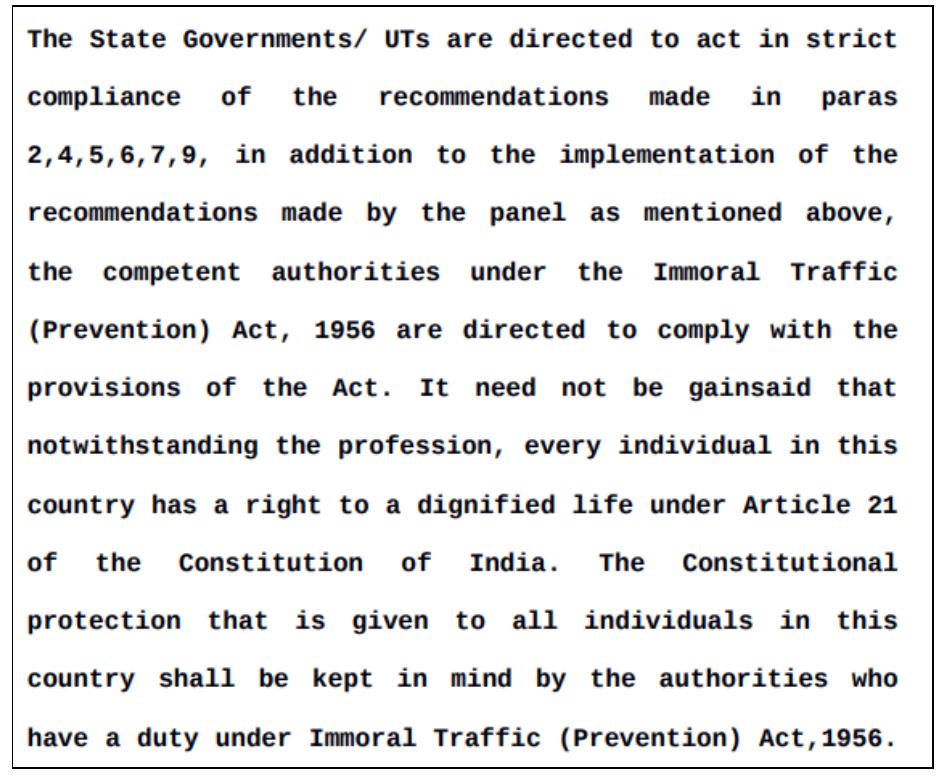
SC: Applications for employment under compassionate grounds must be considered within a period of 6 months
In Malaya Nanda Sethy vs. State of Orissa & Ors., the appellant’s father was working as an Assistant Sub-Inspector in the Excise Department and passed away during service back in 2010. Following his father’s death, the appellant applied for the post of Junior Clerk on the compassionate grounds under the Orissa Civil Service (Rehabilitation Assistance) Rules, 1990 (1990 Rules) in 2011. However, it was left unattended for over 5 years, after which the Additional Secretary asked the Collector to prepare a fresh report on the financial condition of the appellant’s family. In 2020, Odisha replaced the 1990 rules with the Odisha Civil Services (Rehabilitation Assistance) Rules, 2020 which allows one family member of the deceased government servant to be appointed on compassionate grounds to the ‘Group D’ base level post. In 2021, after 10 years of application, the application was sent to the Collector for taking necessary action under the 2020 Rules by the office of the Excise Commissioner. The appellant then approached the state High Court against the consideration of the application under the 2020 Rules. But the High Court dismissed the writ petition stating that the claim should be considered as per the amended rules at the time of consideration of the application and not the rules at the time of death. He then approached the Apex Court challenging the High Court’s decision.
The Supreme Court bench of Justices M.R. Shah and B.V. Nagarathna quashed the High Court’s order and called for consideration of such applications at the earliest point of time (not beyond 6 months) noting that the purpose of appointment on compassionate grounds was to render immediate financial assistance to the family of the deceased. It added that the consideration must be fair, reasonable, and based on relevant considerations.
It is also observed that such applications are kept pending for years which forces the applicants to approach the Courts to get their applications considered. Moreover, even after the Court issues directions, the applications are rejected citing frivolous or vexatious reasons which push the applicants to challenge the order of rejection before the High Court which further prolongs the employment.
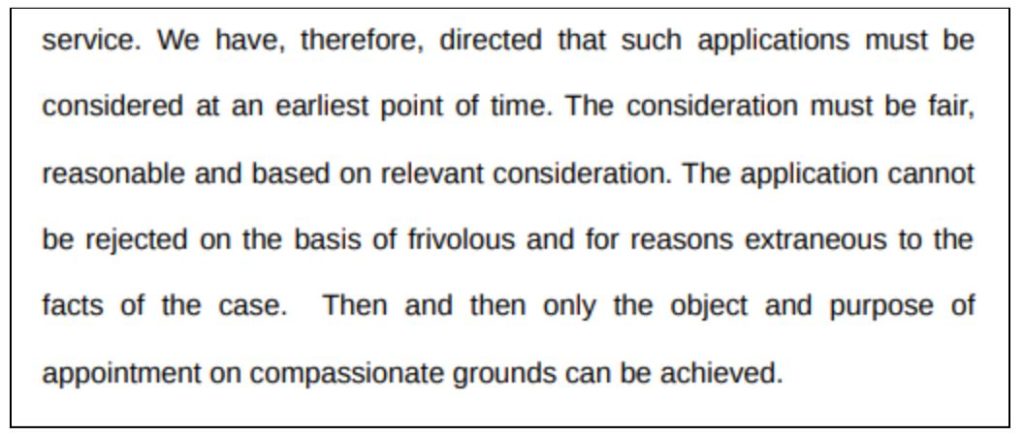
SC: Any fault or shortcoming of the staff of the Subordinate Court or delay in compliance are not reasons for transferring cases
In Nazma Naz vs. Rukhsana Bano, the Allahabad High Court had transferred a criminal case from the Court of Additional Sessions Judge First, Aligarh to the corresponding Court at Mathura because the High Court judge was dissatisfied with the conduct of the staff of the Subordinate Court in not taking on record the order passed by the High Court.
The Supreme Court bench of Justices Dinesh Maheshwari and Aniruddha Bose dismissed the High Court’s order and restored the case to the Aligarh court, adding that any fault or shortcoming on the side of the staff of the Subordinate Court or any delay in compliance by the Court is not reasons to transfer a case.
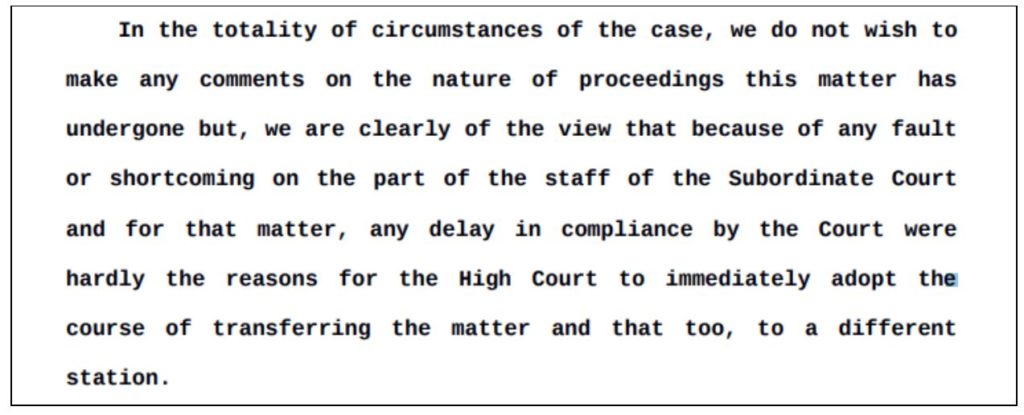
SC: Tax on the supply of a service, which has already been included by the legislation as a tax on the composite supply of goods, cannot be allowed
In Union of India & Anr. vs. M/s. Mohit Minerals Through Director, the respondent is a company which is involved in importing non-coking coal for domestic industries from Indonesia, South Africa, and the US by ocean on a ‘Cost-Insurance Freight’ (CIF) basis. According to a 2017 notification, an IGST rate of 5% is imposed on ocean freight services in a vessel from outside India to the customs station of clearance in India. However, prior to this, the service tax on ocean freight was exempted. According to another notification, the recipient of services of supply of goods by a person in non-taxable territory by a vessel is included as an importer under Section 2(26) of the Customs Act 1962. The respondent company stated that these notifications impose double taxation.
When the appellant approached the Gujarat High Court, it quashed the levying of IGST for being unconstitutional, following which the case was taken to the Supreme Court. The Bench comprising Justices D.Y. Chandrachud, Surya Kant, and Vikram Nat took into consideration multiple factors such as the legislative history of GST, and recommendations of the council, provisions of the IGST Act, etc. and concluded that the recommendations of the GST council only have a persuasive effect and are recommendatory in nature. Both the Union and the States are conferred equal power to legislate on GST and considering the council’s recommendations as binding will be a disruption of fiscal federalism.
It also held that the levy of GST on ocean freight on import is unconstitutional where Indian importer is already paying IGST on CIF value on the composite value of goods, transportation, insurance etc. Additionally, levying a separate amount on the Indian importer for the ‘supply of services’ by the shipping line would violate Section 8 of the CGST Act.
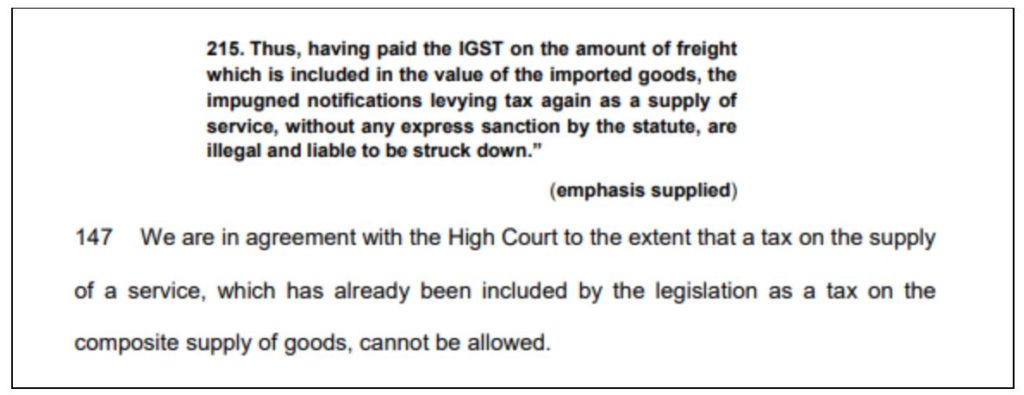
Odisha HC: Every transgender has the right to choose the gender
In Kantaro Kondagari @ Kajol vs. State of Odisha & Ors, the petitioner’s father was a government servant working in Rural Development Department. Following his demise, the family pension was disbursed to his wife, who passed away due to old age-related health issues, after which the petitioner, a transgender (women) and unmarried daughter of late Balaji Kondagari applied for sanction of the family pension in her favour in line with the State’s existent civil service pension rules. Though the petitioner’s application was found to be eligible for the pension, the authorities did not consider the application since the petitioner belonged to the transgender community, and so treated them in a discriminatory manner.
In 2021, the petitioner was given legal recognition by the District Magistrate as a transgender (Women) as per the Transgender Persons (Protection of Rights) Rules, 2020 and the Transgender Persons (Protection of Rights) Act, 2019. The High Court noted that the petitioner’s application was sanctioned but not disbursed. The High Court Bench of Justice Aditya Kumar Mohapatra held that a transgender has every right to choose their gender. In this case, the petition was allowed, and the High Court directed the concerned authority to immediately calculate, sanction, and disburse the family pension to the petitioner within six weeks.
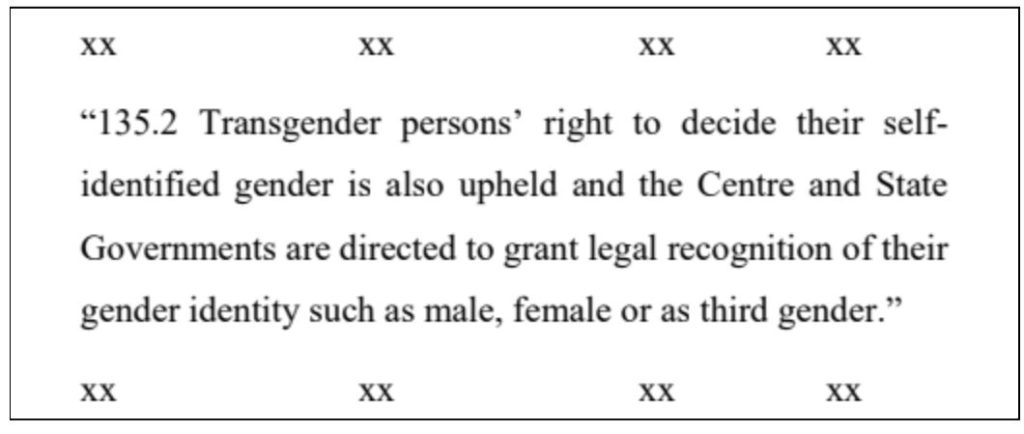
Featured Image: Important Court Judgements


